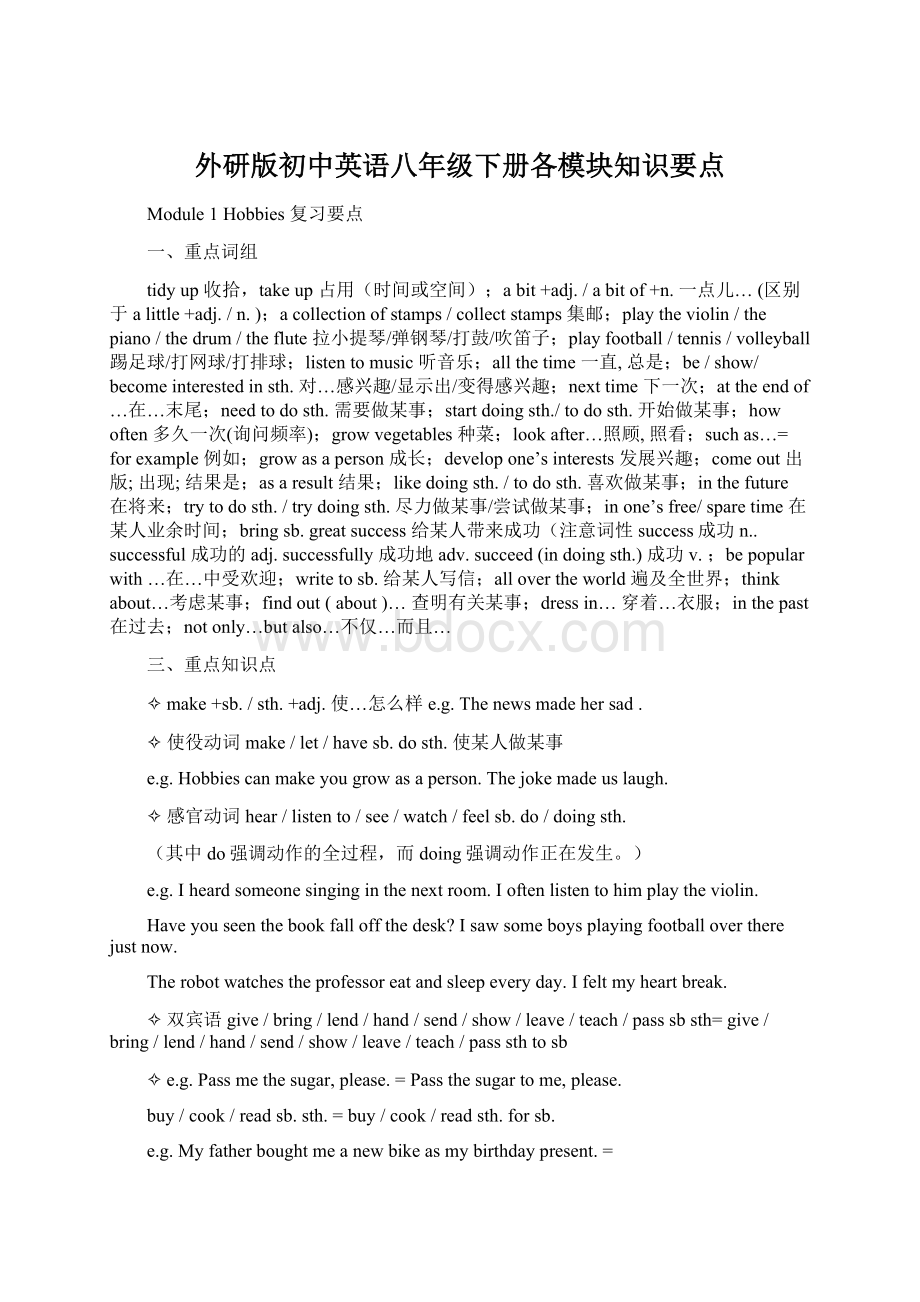外研版初中英语八年级下册各模块知识要点.docx
《外研版初中英语八年级下册各模块知识要点.docx》由会员分享,可在线阅读,更多相关《外研版初中英语八年级下册各模块知识要点.docx(11页珍藏版)》请在冰豆网上搜索。

外研版初中英语八年级下册各模块知识要点
Module1Hobbies复习要点
一、重点词组
tidyup收拾,takeup占用(时间或空间);abit+adj./abitof+n.一点儿…(区别于alittle+adj./n.);acollectionofstamps/collectstamps集邮;playtheviolin/thepiano/thedrum/theflute拉小提琴/弹钢琴/打鼓/吹笛子;playfootball/tennis/volleyball踢足球/打网球/打排球;listentomusic听音乐;allthetime一直,总是;be/show/becomeinterestedinsth.对…感兴趣/显示出/变得感兴趣;nexttime下一次;attheendof…在…末尾;needtodosth.需要做某事;startdoingsth./todosth.开始做某事;howoften多久一次(询问频率);growvegetables种菜;lookafter…照顾,照看;suchas…=forexample例如;growasaperson成长;developone’sinterests发展兴趣;comeout出版;出现;结果是;asaresult结果;likedoingsth./todosth.喜欢做某事;inthefuture在将来;trytodosth./trydoingsth.尽力做某事/尝试做某事;inone’sfree/sparetime在某人业余时间;bringsb.greatsuccess给某人带来成功(注意词性success成功n..successful成功的adj.successfully成功地adv.succeed(indoingsth.)成功v.;bepopularwith…在…中受欢迎;writetosb.给某人写信;allovertheworld遍及全世界;thinkabout…考虑某事;findout(about)…查明有关某事;dressin…穿着…衣服;inthepast在过去;notonly…butalso…不仅…而且…
三、重点知识点
✧make+sb./sth.+adj.使…怎么样e.g.Thenewsmadehersad.
✧使役动词make/let/havesb.dosth.使某人做某事
e.g.Hobbiescanmakeyougrowasaperson.Thejokemadeuslaugh.
✧感官动词hear/listento/see/watch/feelsb.do/doingsth.
(其中do强调动作的全过程,而doing强调动作正在发生。
)
e.g.Iheardsomeonesinginginthenextroom.Ioftenlistentohimplaytheviolin.
Haveyouseenthebookfalloffthedesk?
Isawsomeboysplayingfootballovertherejustnow.
Therobotwatchestheprofessoreatandsleepeveryday.Ifeltmyheartbreak.
✧双宾语give/bring/lend/hand/send/show/leave/teach/passsbsth=give/bring/lend/hand/send/show/leave/teach/passsthtosb
✧e.g.Passmethesugar,please.=Passthesugartome,please.
buy/cook/readsb.sth.=buy/cook/readsth.forsb.
e.g.Myfatherboughtmeanewbikeasmybirthdaypresent.=
Myfatherboughtanewbikeformeasmybirthdaypresent.
☆helpsb.dosth.=helpsb.withsth.帮助某人做某事
e.g.Tomoftenhelpshisclassmatescleantheclassroom.
Mybrotheroftenhelpsmewithmymath.
✧spend…(时间或钱)on+名词spend….(时间或钱)(in)doingsth.
e.g.Davidspentfourweeksonasummercamp.Ispentfivedollarsonthebook.
ShallwespendsometimeplayingtennisonSaturday?
Weusuallyspendonehourdoingmyhomework.
辨析四个“花费”spend,cost,take,pay
spend主语是人,花费的对象可以为时间,也可以为钱,多用于spend…(时间或钱)on+名词/spend….(时间或钱)(in)doingsth.这两个结构中。
e.g.Ispentfivedollarsonthebook.
cost主语是物,花费的对象只能是钱。
e.g.Thebookcostmefivedollars.(注意这里的cost是其过去式)
take的花费对象多为时间,偶而为钱,
e.g.Thejourneybycarwilltakehalfanhour.
另外,take多用于下面的结构中:
Ittakes/took/willtakesb.sometimetodosth.花费某人一些时间做某事。
e.g.Ittookmetwohourstofinishmyhomeworklastnight.
Itwilltaketheworkersoneyeartobuildthisbridge.
pay主语是人,花费的对象为钱,多用于下面的结构中:
pay(sb.)(somemoney)(forsth.)e.g.Ipaidhim20,000dollarsforthehouse.
✧aswellas…
WeallwanttovisitBeijingaswellasShanghai.Heaswellashisfriendsiscomingtoseeme.
(这里注意aswellas…在句中做状语,不是主语成分,所以谓语动词要看前面的主语中心词。
)
✧asksb.(not)todosth./tellsb.(not)todosth.
e.g.Theteacherasksustobequietinclass.Myparentstoldmenottogooutatnight.
✧Whatdoyouthinkof…?
/Howdoyoulike…?
e.g.WhatdoyouthinkoftheGreatWall?
HowdoyoulikeChinesefood?
✧Whynotdosth?
=Whydon’tyoudosth?
e.g.Whynotgototheconcert?
=Whydon’tyougototheconcert?
三、语法
句子:
简单句
并列句:
由并列连词and,but,or等连接两个简单句,两个句子是并列关系。
复合句:
由if,when,while,because,although等引导从句,两个句子有主句与从句之分。
简单句的六种基本句型
1.主语+系动词+表语(+状语)
Thesebooksaregreat.Helooksworried.
2.主语+谓语(不及物动词vi)(+状语)
Thefirstbookcameoutin2003.Wedidn’tgotothecinemayesterday.
3.主语+谓语(及物动词vt)+宾语(+状语)
Iboughtaverygoodbookyesterday.Everymorningmymotherpreparesbreakfastforme.
4.主语+谓语(及物动词vt)+间接宾语+直接宾语(+状语)
Hishobbyhasbroughthimenjoyment.Lastweek,myauntsentmeaboxofchocolate.
5.主语+谓语(及物动词vt)+宾语+宾语补足语(+状语)
Wecanhelpyoudevelopnewskills.Thenewsmadeeveryonehappy.
6.therebe+主语+状语
Therearemanystorybooksinhisschoolbag.
Module2Friendship复习要点
一、重点词组
holdtheline(=holdon)稍等,别挂断;callback打(电话)回来;rightnow现在;takeamessage捎个信儿;leaveamessage留个信儿;whether...ornot是否;infact事实上
acoupleof...几个,若干;inaweek一周后(用于将来时);missone'sclosefriends想念某人的好朋友;bedifferentfrom...(反义:
thesameas...)与...不同(反义:
与...相同)
makefriendswithsb.与...交朋友;goodluckwith...祝...好运;bringsb.foravisittosomeplace带某人来某地参观;waitforsb.(todosth.)等待某人做某事;invitesb.todosth./invitesb.tosomeplace邀请某人去做某事/去某地;talkwith/tosbaboutsth.和某人谈论某事;bytheway顺便说一下;feelhappy/unhappy/better感觉快乐/不快乐/更好;takeplace发生;far(away)fromsomeplace离某地远;beafraidtodosth./beafraidofsth./doingsth.害怕做某事;everytime+时间状语从句每次;want(sb.)todosth.想让某人做某事;worryabout...担心...;sitatthedesk/workatthecomputer坐在桌旁/在电脑前工作;asusual像往常一样;atthatmoment在那时;entertheroom(注意enter是及物动词,后不加介词。
)进入房间;turnback转过身;daybyday一天天地;becloseto...离...近;smileatsb.对...微笑;laughatsb.嘲笑某人;Itdoesn'tmatter(that....)........没关系;not...anymore/not...anylonger不再;giveadvice/takeadvice提出建议/接受建议;lookfor...寻找...;intown/inthecountry在城镇/在乡村
二、重要知识点
*Whatdoesitfeellike?
用来询问对方对某件事的看法。
e.g.WhatdoesitfeelliketobeatschoolinAmerica?
在美国上学感觉如何?
类似的表达还有Whatdoyouthinkof...?
/Howdoyoulike...?
*辨析sometime,sometime,sometimes,sometimes
sometime某个时候,表示时间点,多用于将来。
Ibelievethatmydreamwillcometruesometimeinthefuture.
sometime一段时间,表示时间段,多用于现在完成时。
Hehasbeenhereforsometime.
sometimes有时,表频率,多用于一般现在时。
It'ssometimeshotandsometimescold.
sometimes若干次/若干倍
IhavebeentoSydneysometimes.
*辨析lonely与alone
lonely是adj.表示"孤独的",是内心的感受,而alone可做adj.或adv.,表示"独自一人地",是现实的状况。
e.g.Shefeltlonelybecauseshehadnofriendshere.她因为在这儿没有朋友而感到很孤独。
Theoldwomanlivesalonebecauseherdaughterisabroad.Butsheisnotlonelybecauseweoftengotoseeher.这位老奶奶一个人独自居住,因为她的女儿在国外,但她并不孤独,因为我们经常去看望她。
*辨析other,theother,others,theothers
区分这四个词,只需注意以下两点:
1.没有the表示"别的,其余的";有the强调"其余所有的"
2.若other后没有s则后面往往还有名词(单数情况除外),若other后有s则后面不加名词。
另外,another与这四组词都不相同,它表示"又一个,再一个",所指事物没有范围,而上面那四组词则都是将事物分成了两大部分。
e.g.EnglishisspokennotonlyintheUKandtheUSA,butalsoinmanyothercountries.(这里不强调除英美外,其余所有的国家都说英语,所以不加the,另外,后面有countries,所以other不加s。
)
Theoldladyhasfoursons.OneisinCanada,theothersareinAmerica.
(这里强调除一个在加拿大外,其余所有的都在美国,所以加the,另外,other后面没有名词,所以加s。
)
Wouldyoulikeanothercupoftea?
(这里指再来一杯,没有范围。
)
*当adj.修饰不定代词(something,anything,nothing,everything)时,adj.要后置。
e.g.Ihavesomethingimportanttotellyou.
Hehasnothingnewtosay.
*辨析surprising与surprised
surprising意为"令人惊讶的",修饰物或事;而surprised意为"吃惊的",修饰人。
e.g.Thenewsissurprising.I'msurprisedatthenews.
类似的单词还有exciting(excited),tiring(tired),pleasing(pleased),amazing(amazed)等。
*掌握一些固定电话用语:
IsChenHuanthere?
请问陈欢在吗?
IsthatChenHuan(speaking)?
您是陈欢吗?
MayIspeaktoJack,please?
杰克在吗?
I'llcallbacklater.我一会儿再打。
ThisisSally(speaking).我是Sally。
Who'scalling,please?
请问您是那位?
Holdtheline,please.稍等,别挂断。
Sorry.Heisn'thererightnow.对不起,他现在不在。
CanItakeamessage?
/Canyouleaveamessage?
我能捎个信儿吗?
/您能留个信儿吗?
I'mafraidyouhavethewrongnumber.恐怕您打错了。
四、语法
ObjectiveClause宾语从句
宾语从句可根据引导词分为三大类:
1.当从句是陈述句时,用that引导,that可省略,语序不变。
*Treesimprovetheair.
Bettythinks(that)treesimprovetheair.
*Itwillsnowthiswinter.
Ihope(that)itwillsnowthiswinter.
*Thereisagoodfilmtonight.
Jacksaid(that)therewasagoodfilmonthatnight
2.当从句是一般疑问句时,用if或whether引导(若句尾有ornot,则用whether,语序由原来的疑问句语序变为陈述句语序。
*WilltheyplanttreesonSunday?
Hedoesn'tknowwhethertheywillplanttreesonSundayornot.
*Haveyouseenhimbefore?
Ican'trememberifIhaveseenhimbefore.
*Wasshelateforclassthismorning?
Heasksifshewaslateforclassthismorning.
*Didshestudyhard?
Ididn'tknowwhethershestudiedhardornot.
3.当从句是特殊疑问句时,用原来的特殊疑问词引导,语序由原来的疑问句语序变为陈述句语序。
*Howcanwehelpprotecttheenvironment?
Heaskshowwecanhelpprotecttheenvironment.
*Whydotheylikecomputergamessomuch?
Ican'tunderstandwhytheylikecomputergamessomuch.
*Whenwillweholdthesportsmeeting?
Doyouknowwhenwewillholdthesportsmeeting?
*Wheredidtheaccidenthappen?
Tomaskedmewheretheaccidenthappened.
掌握宾语从句,尤其要注意以下三个方面:
1.引导词
2.语序
3.时态:
若主句是现在范畴的时态,从句用任何时态均可。
若主句是一般过去时,从句必须用过去范畴的时态。
Exercises(练习):
1)Yourfatherisadoctor.(Iknow)
2)What'shegoingtodo?
(Hedoesn'tknow)
3)Shouldshegototheparty?
(Shecan'tdecide)
4)Whendidhelastseehisoldfriends?
(Hecan'tremember)
5)DoyoulikelivinginChina?
(CanIaskyou)
6)Whatdoessheusuallydo?
(Tomasked)
7)WheredidMikestudytwoyearsago?
(Doyouknow)
8)Doyoudoyourhomeworkintheevening?
(Couldyoutellme)
9)Whatdoeshedoatweekends?
(Iwonder)
10)Howdothingswork?
(ThomasEdisonlikedtofindout)
Module3知识与语法要点
重点词组:
1. takesb.around=showsb.around 带某人四处参观2. mentionsb./sth.(tosb.) (向某人)提及某人/事 3. lookoutfor… 小心…4.stoptodosth.停止去做某事(不是同一件事)stopdoingsth. 停止做某事(停下手头上正在做的事情)5. needsth. 需要某物needtodo 需要做某事needdoingsth.需要被…(表被动)6. enjoydoingsth. 享受做某事7. keepsb./sth.adj. 使某人/某事保持……keepdoingsth. 使……持续做某事8. maybe adv.也许 maybe情态动词+be“也许是”9.join参加/加入(组织、团体、党、团……)takepartin 参加(聚会、活动)10. preparefor=getreadyfor 准备……11. hatesb./sth. 讨厌某人/事hatedoingsth. 讨厌做某事(长时间的,习惯性的)hate